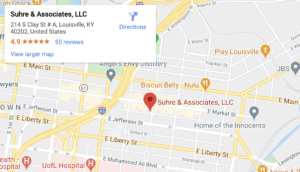
If you have been convicted of a criminal offense in Kentucky and exhausted all your appeals, you might assume there is nothing left for you to do except to serve your sentence. Unfortunately, your sentence is not the only consequence of a criminal conviction. A criminal record and the loss of civil rights follow you long after you are released from prison.
Individuals convicted of crimes might have difficulty finding a job or renting a home. Their conviction could affect their ability to receive government assistance or college loans. Felony convictions can prevent a person from owning a firearm or voting in elections.
If your loved one is currently serving a prison sentence or your criminal record is making it challenging for you to overcome your past, you might want to consult a criminal defense lawyer experienced in state and federal crimes about a petition for clemency.
Table of Contents
Defining Clemency
Clemency is the act of commuting a criminal sentence or pardoning a criminal. The President of the United States has clemency power regarding federal criminal convictions through executive clemency powers. Section 77 of the Kentucky Constitution gives the Governor the power to grant pardons and reprieves.
Pardons vs. Commutations
Pardons and commutations overlap in some ways, but they are very different in a few key ways.
A pardon is the forgiveness of a crime. The pardon does not state that the person is not guilty of the crime or erases the person’s criminal record. The pardon merely restores individual civil liberties and releases the person from prison, if the person has not completed his or her sentence.
On the other hand, a commutation does not forgive the criminal conviction. A commutation reduces the sentence imposed for the criminal conviction. A person may be released from prison and other criminal penalties upon receiving a commutation.
A difference between pardons and commutations is that a pardon can stop a potential criminal charge or wipe out a prior conviction. A commutation only implies that the sentence for a crime may have been excessive, or there is evidence that the person has earned the right to a reduced sentence.
If a person was convicted of a felony and is only seeking restoration of civil rights, there is a separate process for obtaining the restoration of civil rights.
How Do You Apply for a Pardon or Commutation in Kentucky?
Applications for pardons and commutations must be submitted to the Office of the Governor. You must use the official form provided by the Governor’s Office. The application must be completed in full, or the Governor will not consider it.
Information that must be included in the petition for a pardon or commutation includes:
- Personal information about the applicant, such as the person’s name, aliases, address, marital status, social security number, number of children, etc.
- A complete list of all criminal charges and convictions, including past and present misdemeanors, felonies, and parole/probation violations, including specific information about each conviction or charge
- Answers to questions regarding current indictments, outstanding fines, disciplinary infractions while in prison, and unpaid restitution
- Information about the applicant’s education, employment history, and military information
The application must have a letter attached to it from the applicant describing why the person is seeking a commutation or pardon. The letter should include a description of the extenuating circumstances that support the request for a commutation or pardon.
Additionally, the petition must also include three letters of recommendation in support of granting the pardon or commutation. More than three letters may be included, but a minimum of three recommendation letters is required to consider the application. Sources may include, but are not limited, to family members, church members, employers, co-workers, elected officials, pastors, prosecutors, and judges.
Evaluation of a Pardon or Commutation Request
The Governor has the sole power to issue pardons and commutations. He is not required to consult with the legislature, boards, or other parties before deciding whether to grant an application. In most cases, applications for pardons and commutations are reviewed by the Governor’s Deputy Counsel before the Governor makes a final decision on whether to grant the application.
There are no hearings on applications for clemency. The Governor may use whatever information he desires to make his decision. However, factors that may be considered include whether the applicant has accepted responsibility, the seriousness of the offense, and the applicant’s post-conviction conduct.
How Is an Expungement Different From a Pardon?
The key difference between an expungement and a pardon is that the expungement erases information from your criminal record.
Information that might be removed from your criminal record through expungement could include:
- Arrest records
- Criminal charges
- Plea agreements
- Criminal convictions
When a record is expunged, it will not show up on criminal background checks. However, expungements only affect official criminal records. Mugshots and information about arrests may still be found on non-government websites.
Am I Eligible for an Expungement?
Kentucky expungement laws restrict who can have their criminal record erased. You could be eligible to have your criminal record expunged if:
- It has been at least five years since you completed your criminal sentence or probation
- You pleaded guilty to certain Class D felonies
- The court dismissed the criminal charges with prejudice
- You have never been convicted of a sex crime
- There are no pending criminal charges against you
- You have never been convicted of a crime involving a child
You must wait at least 60 days after your case has been dismissed with prejudice to file a petition to expunge your criminal record. If you were convicted of a crime, you must wait five years after completing your sentence to petition for an expungement. Expungements are granted by judges after a hearing to review your petition.
What Types of Crimes Can Be Expunged?
Many Class D felonies and non-violent misdemeanors or eligible for expungement.
Examples of offenses that might be expunged include:
- Shoplifting
- Drug possession
- Third-degree burglary
- Some types of white collar crimes
- DUI
- Marijuana cultivation
- Criminal trespassing
- Identity theft
- First-degree criminal mischief
- Disorderly conduct
- Juvenile crimes
- Bigamy
- Public intoxication
A criminal record can make it difficult to find a job or live where you want to live. You may not qualify for scholarships or other assistance. Erasing your criminal record can give you the chance to make a fresh start without the past hanging over your shoulder.
Contact a Louisville Criminal Defense Lawyer for a Free Consultation
If you have questions about a pardon, commutation, or expungement, contact our office to discuss your situation with a criminal defense attorney. Our Louisville criminal defense attorneys provide aggressive and skilled representation when you are dealing with the criminal justice system. Your best defense to criminal charges begins with hiring a criminal defense lawyer to handle your case.

